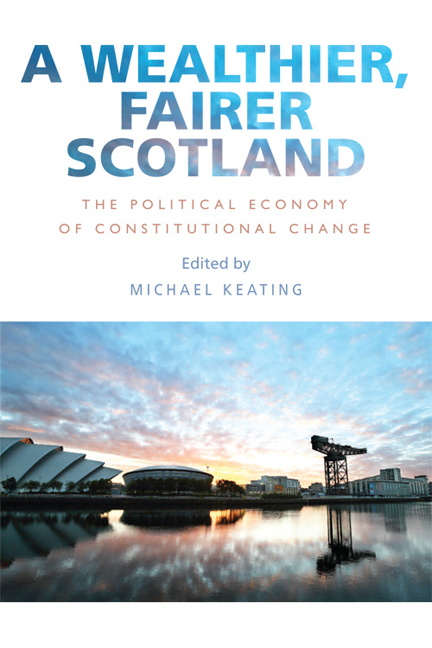Book contents
- Frontmatter
- Contents
- List of Figures
- List of Tables
- List of Contributors
- Preface
- 1 The Political Economy of Devolution
- 2 Taxes and Spending
- 3 Inequality in Scotland: Dimensions and Policy Responses
- 4 Towards a Fairer Scotland? Assessing the Prospects and Implications of Social Security Devolution
- 5 A More Gender-Equal Scotland? Childcare Policy in Scotland after the Independence Referendum
- 6 Constitutional Change, Social Investment and Prevention Policy in Scotland
- 7 Getting to a Wealthier and Fairer Scotland
- References
- Index
1 - The Political Economy of Devolution
Published online by Cambridge University Press: 22 December 2017
- Frontmatter
- Contents
- List of Figures
- List of Tables
- List of Contributors
- Preface
- 1 The Political Economy of Devolution
- 2 Taxes and Spending
- 3 Inequality in Scotland: Dimensions and Policy Responses
- 4 Towards a Fairer Scotland? Assessing the Prospects and Implications of Social Security Devolution
- 5 A More Gender-Equal Scotland? Childcare Policy in Scotland after the Independence Referendum
- 6 Constitutional Change, Social Investment and Prevention Policy in Scotland
- 7 Getting to a Wealthier and Fairer Scotland
- References
- Index
Summary
Scotland after the referendum
The Scottish independence referendum of 2014 was a momentous event, which engaged the political class and the general public like few political events before it. The question on the ballot paper was, in appearance, a simple one with a straightforward answer, whether Scotland should be an independent country. A second question, on more devolution or a radical rearrangement of Scotland's relationship with the UK, was explicitly ruled out. Yet in practice, the two sides showed a degree of convergence on precisely this middle ground. One reason was that, as our research showed, public opinion was strongly clustered there (Liñeira, Henderson and Delaney 2017). Another was that, in the modern world, nations are interdependent and old ideas about sovereignty hide the limitations in the freedom of action of all but the most powerful states. So the debate moved quickly from dry constitutional issues to economic and social policy and how Scotland could achieve better outcomes, either in or out of the Union; it is this that accounts for the reach of the debate into civil society. Another feature of the Scottish debate was that it mostly did not pit different visions of future society against each other but rehearsed ways of achieving much the same goals. The two main parties in Scotland, while divided on constitutional matters, shared the same broadly social democratic ideology, while the Conservatives stayed in the political centre. Only a minority of voices called for a market-liberal model of state in which taxes would be cut and the scope of the public sector radically curtailed. So what the debate hinged on was whether large or small states are economically more efficient or whether social justice was better conceptualised and achieved at a UK or a Scottish scale. These issues are covered in another of our books, Debating Scotland (Keating 2017).
The referendum was followed by the Smith Commission. This was an all-party body set up to meet a pledge (the ‘vow’) made by the unionist parties in the last stage of the campaign to give Scotland more devolved powers but building on earlier work by the parties themselves.
- Type
- Chapter
- Information
- A Wealthier, Fairer ScotlandThe Political Economy of Constitutional Change, pp. 1 - 25Publisher: Edinburgh University PressPrint publication year: 2017



